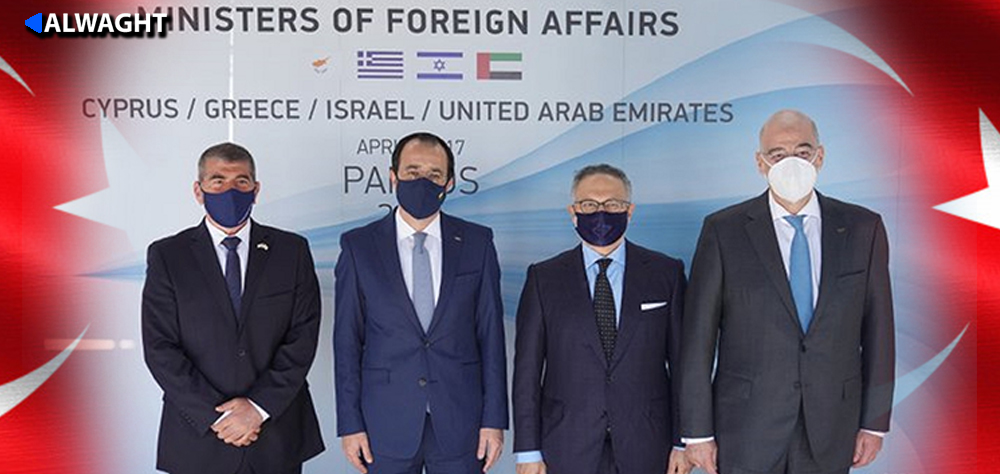Alwaght- On Saturday, Greek, Israeli, and Cypriot foreign ministers and the Emirati minister of state for foreign affairs met in Cyprus to discuss what have been described "strategic" partnership.
The quadripartite meeting was hold while on the one hand Turkey was at loggerheads with Cyprus, Greece, and the Israeli regime in the Eastern Mediterranean and on the other hand Ankara over the past three months Ankara tried to mend ties with Tel Aviv, de-escalate with the Abu Dhabi, and open the door for dialogue with Athens.
What goals drive the meeting?
The summit, held in Pathos, was attended by the Israeli Foreign Minister Gabi Ashkenazi, Greek Foreign Minister Nikos Dendias, Cypriot Foreign Minister Nikos Christodoulides, and Emirati Minister of State for Foreign Affairs Anwar Gargash.
In a provocative speech, Ashkenazi described the meeting as a new strategic partnership that stretches from the coasts of the Persian Gulf to the Mediterranean Sea and Europe. The Representatives of the UAE and the Israeli regime tried to highlight the geostrategic dimensions of the meeting and paint it a sign of a change in the face of West Asia region.
Greece, on the other hand, which has deep geopolitical differences with Turkey that was deepened by maritime agreement between Turkey and Libya reached in November 2019, sought to use the meeting as a leverage to put pressure on Ankara. Greece opposes the Turkish intervention in Libya and its FM in a remarks directed at Turkey said that Greece was committed to solving the problems according to the international laws and wanted foreign forces out of Libya.
"Greece seeks positive relations with neighboring countries and has invited the Turkish foreign minister to visit Athens," said Dendias.
The UAE, which considered by Turkey as an uninvited guest, said that political solutions were the only way to end the conflicts in the region and the quadripartite meeting was an opportunity to exchange views and coordinate cooperation at the highest levels. The apparently anti-Turkish meeting dashed hopes of President Recep Tayyip Erdogan of Turkey to normalize with the Israelis and Emiratis.
Turkey’s political dire straits
Since President Erdogan embraced neo-Ottomanism and made North Africa and Caucasus a scene for his influence and power play and show, Ankara accepted any help to expand its range of influence in return for political and economic privileges. One example is the Israeli military equipment of Azerbaijan, a Turkish ally, in the war against Armenia over the disputed Karabakh. The Israeli aids gave the Turkish policy, which underwent 10 dark years with Tel Aviv, change all of a sudden. After Israeli forces' attack on the Turkish Gaza-bound boat, dubbed Freedom Flotilla, in 2010, Ankara cut off ties to the Israeli regime. Although their relations slightly improved in 2016, they remained chilly overall. Azerbaijan President Ilham Aliyev, who won the war on the strength of the Turkish diplomatic and military support, found the ground ripe for mediation between Israel and Turkey. Ankara was hasty to show zeal for normalization.
In November 2020, Ankara set up a secret channel with Tel Aviv, and Hakan Fidan, the head of the Turkish National Intelligence Organization, met several times with Israeli security officials, including spy chief Yossi Cohen. But the Israelis, who are badly interested in normalizing relations with the Arab countries, see a decline in their need for Turkish normalization. In addition, the Israeli regime is capitalizing on the Saudi-Emirati differences with Turkey, and is playing with Ankara with this card.
What made Cyprus summit a marked new scene for confrontation of the Turkish regional policies was the UAE participation. Except for the rivalry and differences in Libya, the UAE has no specific reason to join hands with the Israeli regime, Greece, and Cyprus in the Eastern Mediterranean. So its presence sews the ideological aspects to geopolitical ones, as Abu Dhabi is starkly against Ankara's pro-Muslim Brotherhood policies in the region.
Tel Aviv is reaping its economic, political, and geopolitical advantages as Ankara is watching. In early 2019, the Israeli regime established a gas association with six countries of Cyprus, Greece, Palestine, Italy, Egypt and Jordan. In March 2021, it signed a MoU on the EU-backed "Euro-Asia Interconnector" power transmission project involving Greece and Cyprus. So, now the EU is dragged to the Mediterranean. The more the EU's geo-economic interests are interwoven with the Eastern Mediterranean coastal states, the greater the likelihood of a confrontation between Turkey and Europe and EU sanctions against Ankara would be.
Turkey has no ally in this sea, except for Northern Cyprus and the Libyan government, which is further away from the Eastern Mediterranean. Therefore, it is in the weakest position. On the other hand, Erdogan is determined to develop and exploit the Mediterranean oil and gas fields. But the UAE's alliance with the three others at the Cyprus summit simultaneously targeted Erdogan's neo-Ottomanism and Turkey's geostrategic interests.
"Israel's attack on Gaza is a clear Israeli policy towards Muslims," Erdogan said in a sharp response on Sunday after Tel Aviv’s recent airstrikes on Gaza. "As long as Israel insists on holding this position, our bilateral relations will not be able to reach the level we have hoped for," he went on. Erdogan's tone this time was harder than that of over the past three months when he commented on the Israeli raids on the Palestinian enclave.
The new changes in the vicinity of Turkey and strategic significance of Cyprus meeting subject Erdogan to serious challenges in adopting a suitable regional policy in the face of political and geopolitical red lines. Therefore, it has been inevitable for Turkey to fundamentally review its regional policies. Still, with the Israeli provocative measures and determination to develop energy resources, Ankara disputes with Tel Aviv are set to increase.



























